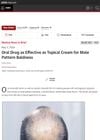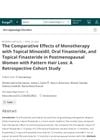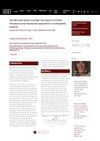 July 2024 in “Journal of the American Academy of Dermatology”
July 2024 in “Journal of the American Academy of Dermatology” Low-dose oral minoxidil is generally safe for hypertensive patients with hair loss.
 June 2024 in “British Journal of Dermatology”
June 2024 in “British Journal of Dermatology” PRP with topical minoxidil is the most effective treatment for increasing hair density in androgenetic alopecia.
 June 2024 in “British Journal of Dermatology”
June 2024 in “British Journal of Dermatology” Combining PRP with topical minoxidil is the most effective for increasing hair density in male pattern baldness.
 June 2024 in “European Journal of Clinical and Experimental Medicine”
June 2024 in “European Journal of Clinical and Experimental Medicine” Oral minoxidil for hair loss can cause weight gain due to fluid retention.
 June 2024 in “Dermatology and therapy”
June 2024 in “Dermatology and therapy” Low-dose oral minoxidil is safe for treating children's hair disorders.
Media coverage led to more dermatologists prescribing low-dose oral minoxidil for hair loss.
 May 2024 in “JAMA Dermatology”
May 2024 in “JAMA Dermatology” Oral contraceptive use may increase the risk of frontal fibrosing alopecia in women with a specific CYP1B1 gene variant.

Oral minoxidil works as well as topical minoxidil for male pattern baldness.
 May 2024 in “Anais brasileiros de dermatologia/Anais Brasileiros de Dermatologia”
May 2024 in “Anais brasileiros de dermatologia/Anais Brasileiros de Dermatologia” Oral minoxidil 7.5 mg for hair loss increases heart rate but not blood pressure.
 April 2024 in “Anais brasileiros de dermatologia/Anais Brasileiros de Dermatologia”
April 2024 in “Anais brasileiros de dermatologia/Anais Brasileiros de Dermatologia” Using both minoxidil and biotin together increased hair growth more than using either one alone.
 April 2024 in “Skin appendage disorders”
April 2024 in “Skin appendage disorders” Oral finasteride seems more effective for hair loss in postmenopausal women, but more research is needed.
 April 2024 in “Clinical and experimental dermatology”
April 2024 in “Clinical and experimental dermatology” Tofacitinib is effective for severe alopecia areata, similar to oral betamethasone.
 April 2024 in “International Journal of Dermatology”
April 2024 in “International Journal of Dermatology” Oral minoxidil may worsen hangover symptoms when combined with alcohol.
 April 2024 in “JAMA dermatology”
April 2024 in “JAMA dermatology” Oral minoxidil is as effective as topical minoxidil for male hair loss but has more side effects like excessive hair growth and headaches.
 March 2024 in “JAAD International”
March 2024 in “JAAD International” Using both topical and oral minoxidil doesn't significantly reduce temporary hair shedding.
Oral minoxidil helps hair growth but has more side effects than the topical version.
 March 2024 in “Clinical, Cosmetic and Investigational Dermatology”
March 2024 in “Clinical, Cosmetic and Investigational Dermatology” Saudi dermatologists know about low-dose oral minoxidil for hair loss but don't often prescribe it, partly due to its unavailability.

Most dermatologists use and find oral minoxidil effective and tolerable for hair loss treatment.

Oral Minoxidil can cause serious eye problems, but stopping it can improve vision.
 February 2024 in “Cosmoderma”
February 2024 in “Cosmoderma” Low-dose oral minoxidil can help treat male and female pattern hair loss, especially in those who can't use topical treatments or have heart health issues.
 December 2023 in “Journal of health and rehabilitation research”
December 2023 in “Journal of health and rehabilitation research” Oral Apremilast effectively treats alopecia areata in most patients.
 December 2023 in “Journal of Drugs in Dermatology”
December 2023 in “Journal of Drugs in Dermatology” Media coverage increased public interest in oral minoxidil for hair loss but may also spread misinformation.
 December 2023 in “Current Dermatology Reports”
December 2023 in “Current Dermatology Reports” Oral minoxidil is a potential treatment for hair loss.
 November 2023 in “Journal of Cosmetic Dermatology”
November 2023 in “Journal of Cosmetic Dermatology” Oral minoxidil is more convenient but topical minoxidil improves hair density better.

Oral Minoxidil could be a safe and effective alternative treatment for various non-androgenic alopecias.
 November 2023 in “Current Dermatology Reports”
November 2023 in “Current Dermatology Reports” Oral minoxidil is effective for various hair loss types and may improve male sexual function, but aspirin can reduce its effectiveness.
 November 2023 in “Food science of animal resources”
November 2023 in “Food science of animal resources” Lactilactobacillus curvatus LB-P9 taken orally helps hair regrow faster and thicker in mice.
 November 2023 in “Skin appendage disorders”
November 2023 in “Skin appendage disorders” Public interest in oral minoxidil for hair loss increased after a New York Times article.
 November 2023 in “PubMed”
November 2023 in “PubMed” Combining stem cell-conditioned media with anti-androgen drugs can improve hair growth in male pattern baldness.
 November 2023 in “The journal of investigative dermatology/Journal of investigative dermatology”
November 2023 in “The journal of investigative dermatology/Journal of investigative dermatology” Oral Janus kinase inhibitors may be an effective treatment option for lichen planopilaris with some risk of increased cholesterol and liver enzyme levels.




























